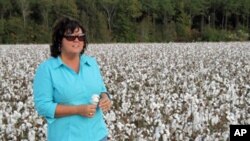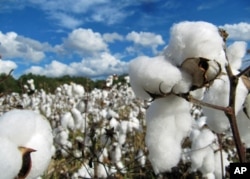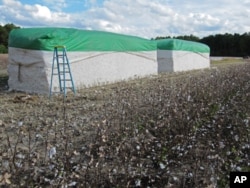On a sunny afternoon in the southern U.S. state of North Carolina, Gwen Pitt is supervising the cotton harvest. As a large machine mashes the cotton into a solid brick a bit smaller than a train car, Pitt says her crop is destined for one of the world's most popular fashion items.
"We have found out that most of our cotton here in eastern North Carolina goes to make jeans," she says.
She says it takes a lot of fuel to grow and harvest all that cotton. The picking machine alone guzzles down nearly 400 liters of fuel per day. And while they're harvesting cotton in this field, they're planting wheat in fields nearby.
"Tractors are always running," she says. "So we're always burning fuel."
Opponents to Copenhagen deal fear higher expenses
As climate negotiators meet in Copenhagen, Denmark, many scientists say that farmers around the world will have to adjust to more extreme temperatures, droughts and floods as a result of global warming. But in the United States, the nation's largest farmers' organization, the American Farm Bureau Federation, opposes any strong actions to counter climate change, either in Copenhagen or in the U.S. Congress.
Pitt and many other U.S. farmers are concerned that measures to address climate change may make fuel more expensive. Those proposals seek to lower emissions of greenhouse gases by raising the cost of gasoline, coal, natural gas and other fossil fuels. And since natural gas is a major ingredient in fertilizer, the cost of this essential farm supply could go up, too.
The Farm Bureau is lobbying Congress to reject a pending climate change bill. Bob Stallman, president of the bureau, says the extra costs will make it harder for farmers to stay in business.
"Our margins are really thin, in terms of our bottom line, and any additional costs have to be absorbed by the farmer because we can't pass on those costs to consumers directly," he says.
Some climate skeptics question cause of warming
Costs aside, you'll find a lot of basic skepticism at the Farm Bureau and among farmers like Gwen Pitt that human pollution is responsible for climate change.
Pitt says, "My feeling on climate change is, I don't know that what we do as Americans or as people is what's causing most of what's happening. I think nature has its own course."
But other farmers disagree. The National Farmers Union, a smaller farmers' group, supports action on climate change. President Roger Johnson says the science is convincing. And he doesn't think a climate change bill would hurt farmers nearly as much as climate change will, through droughts, floods and other extreme weather.
"All these different events are going to harm production. We know that," he says. "You want to talk about a cost increase? You put the whole crop in and you harvest nothing? I mean, I've seen that. I've been through that on my farm. The experts say you will see that with much increased frequency over time."
By some calculations farmers face only minor cost hikes
Johnson contends that the legislation Congress is considering would impose miniscule costs on farmers. He points to analysis by the U.S. Department of Agriculture that calculates the proposed law would reduce farmers' incomes by about 1 percent in the short term, and about seven percent over coming decades.
"I farmed most of my life," he says, "and I can point to any number of weeks when I saw more than a seven percent swing in my costs. For anyone who says a 1 percent increase or a seven percent increase 25 years from now is going to be the end of agriculture, I mean, it just defies the real world."
The USDA analysis also concludes that the climate bill now before Congress gives farmers opportunities to more than offset their financial losses, although not all farmers may be able to take advantage of them.
Johnson concludes that farmers can handle the costs of capping greenhouse gases, especially because the costs of doing nothing could be far worse.











